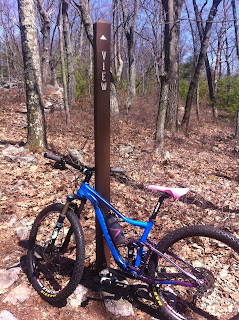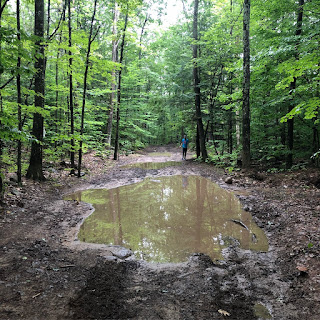Miscommunications lead to fall out
So many things that I wish I knew
So many walls up I can't break through
Now I'm standing alone in a crowded room
And we're not speaking
And I'm dying to know
Am I killing you? Or are you killing me? Yeah
I don't know what to say since the twist of fate
When it all broke down and the story of us
Looks a lot like a tragedy now
It turns out that I can write Taylor Swift parodies about bikes, trails, dudes, races, and now, even my own body parts. I debated on even sharing the news about my breast surgery in November because it was so minor, and it turns out that it was basically a false alarm. There was a lot of miscommunication when my old doctor retired last December, and when I finally went to see his replacement a couple of months later than I was supposed to, she immediately wanted to do surgery based some year-old biopsy results that I’d been told were fine during my last conversation with my old doctor. I just sort of went along with it, she did the surgery, and they found nothing but healthy tissue and an old biopsy clip. At least I got some extra days off work, I guess.
This story wouldn’t even warrant telling except that a few days after the surgery I noticed a clearly discernible pea-size mass in my left breast which is just generally lumpy now due to all the scar tissue from the last lumpectomy and a couple of other subsequent needle biopsies. It’s had a rough couple of years. Unfortunately, this was something distinct from the normal generally lumpy feeling, and the concerning part was that it seemed to have suddenly popped up out of nowhere.
I went through yet another round of the mammogram, ultrasound, MRI, and needle biopsy, although the radiologist who did the biopsy wasn’t completely convinced that it wasn’t just a sebaceous cyst that she was going to inflame by poking at it. Everything seemed so routine that I didn’t even have a follow-up appointment with my surgeon, so when she called me on Wednesday morning to say I needed to make an appointment to get my pathology results, I knew it was a bad sign. However, I was expecting, “You need to have another lumpectomy” bad. Frank offered to come with me, but I knew I had to rush back to State College for a dentist appointment after and I really only expected the whole thing to take 15 minutes.
Unfortunately, she told me that the latest biopsy was DCIS, which I had a couple of years ago. At the time I opted to forgo the recommended radiation, because there was a good chance that the surgery had gotten rid of it, and it wouldn’t come back. Now that it did, she was encouraging me to get a mastectomy on the left side, or at the very least, get another lumpectomy plus radiation this time.
The thing about DCIS is that while it is technically cancer, it is non-invasive, and it there’s still some debate as to the general likelihood that it will ever be. Of course, I’m glad to not have “real cancer”. I don’t have to have chemo, and if I give in and consent to the mastectomy, no radiation. If I give in now, I can get a high-quality implant and keep my real nipple, albeit likely cold and numb for the rest of my life. I’m afraid of the recovery time and its effect on my next race season, but realistically it’s comparable to the collar bone break from which the bike injury gods have somehow spared me for 13 years, so maybe I’m just due for an ill-timed hiatus. What I can’t shake is the feeling of dread when I imagine spending the rest of my life looking down at the aesthetically acceptable but basically dead mass stuck to my chest and wondering if it was worth it.
“Cancer has a language problem--not just in the way we speak about it, as a war that drafts soldiers who never signed up for it, who do battle and win, or do battle and lose. There's also the problem of the word itself. A 57-year-old woman with low-grade DCIS that will almost certainly never become invasive hears the same word as the 34-year-old woman who has metastatic malignancies that will kill her. That's confusing to patients conditioned to treat every cancer diagnosis as an emergency, in a world that still reacts to cancer as though it's the beginning of the end and in a culture where we don't talk about death until we have to.” – Time Magazine Article
My biggest problem in relation to the quote above is that I am not a 57-year-old woman with DCIS; I am a 38-year-old woman with DCIS, so doctors don’t know WTF to do with me. Friends and acquaintances don’t know what do with me, because DCIS doesn’t fit into the “breast cancer” narrative in anyone’s head. For something that accounts for 25% of breast cancer diagnosis, I’ve yet to hear about anyone else with a story similar to mine (age, diagnosis, etc.), so it’s hard to know where to look for guidance. I’ve come across a handful stories of 30-something-year-old otherwise healthy cyclists who suddenly discover invasive cancer, accept their mastectomies like champs, and altogether embrace the “brave survivor” story that we love to hear about in others while we not-so-secretly fear it for ourselves.
I can’t see myself as a “brave survivor” right now, because I’m not even sure what it is that I’m supposed to be surviving. My life isn’t in danger right now; my future quality of life is, and all of the options seem equally bad in their own way. I realize that regardless of the diagnosis; invasive cancer, recurring DCIS, or BRCA positive; everyone who faces it probably goes through a similar stage of, “Why is this happening to me? I want this to not be happening to me.” Then you’re supposed to be brave and do what you have to do. People expect it. Except they aren’t the ones that have to live with it. That’s the part they never tell you.
I think this is the part of the post where I’m supposed to end on a positive note, but I’m nowhere near there yet. I’m still struggling to write my own story, which hopefully will be useful to someone else later. I think it’s important share a “cancer” narrative that doesn’t fit the mold, but that is brutal its own lonely way.








































